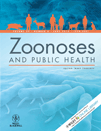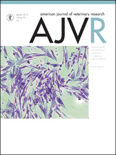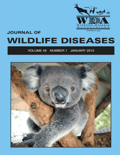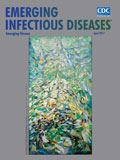
Zoonoses and Public Health
Scope & Guideline
Empowering research to enhance public health resilience.
Introduction
Aims and Scopes
- Zoonotic Disease Surveillance:
Research focused on monitoring and analyzing diseases that can be transmitted from animals to humans, including epidemiological studies and outbreak investigations. - Risk Assessment and Public Health Implications:
Studies that assess the risk factors associated with zoonotic diseases, including socio-environmental influences, and their implications for public health policies. - Pathogen Detection and Characterization:
Research involving the molecular detection, characterization, and resistance profiling of zoonotic pathogens in various animal hosts and environmental samples. - One Health Approach:
Interdisciplinary studies that integrate human, animal, and environmental health to address zoonotic diseases through collaborative strategies. - Antimicrobial Resistance:
Investigations into the prevalence and mechanisms of antimicrobial resistance in zoonotic pathogens, particularly in relation to livestock and companion animals. - Public Awareness and Behavioral Studies:
Research aimed at understanding public knowledge, attitudes, and behaviors towards zoonotic diseases and preventive measures.
Trending and Emerging
- Emerging Zoonotic Diseases:
Recent publications highlight an increased focus on newly emerging zoonotic diseases such as SARS-CoV-2 and other novel pathogens, reflecting the urgent need for surveillance and understanding of these threats. - Antimicrobial Resistance and One Health:
There is a growing emphasis on studies that address antimicrobial resistance from a One Health perspective, integrating animal health, human health, and environmental factors. - Climate Change and Zoonosis:
Research investigating the impact of climate change on the emergence and spread of zoonotic diseases is on the rise, emphasizing the need for adaptive public health strategies. - Socio-environmental Determinants of Health:
Increasing attention is being given to how socio-environmental factors influence the occurrence and transmission of zoonotic diseases, indicating a shift towards holistic health approaches. - Public Health Communication and Education:
Emerging themes include the importance of public health communication strategies and educational interventions to enhance community awareness and response to zoonotic risks.
Declining or Waning
- Traditional Zoonotic Diseases:
Research related to historically significant zoonotic diseases such as rabies and certain foodborne pathogens like Salmonella may be receiving less attention as newer threats and emerging diseases gain focus. - Animal-Based Studies:
There seems to be a waning interest in studies that solely focus on zoonotic pathogens in wildlife or companion animals without a direct public health implication compared to integrated One Health studies. - Geographical Specificity:
Publications that focus narrowly on specific geographical regions or localized outbreaks may be declining, as broader, comparative studies with regional implications become more relevant. - Veterinary Practices:
Research specifically centered on veterinary antimicrobial practices may be declining as the focus shifts towards broader public health implications and cross-sector collaborations.
Similar Journals

Lancet Microbe
Elevating the Standards of Microbial ScienceThe Lancet Microbe is a leading peer-reviewed journal published by ELSEVIER, focused on advancing research in the fields of infectious diseases, microbiology, and virology. Since its inception in 2020, this open-access journal has rapidly achieved a prestigious reputation, evidenced by its impressive rankings in the Scopus Ranks, where it holds positions within the top 10 in multiple categories and boasts high percentiles, reflecting the impact and relevance of its published works. With a quarterly publication schedule, the Lancet Microbe aims to disseminate critical findings and foster innovation within the scientific community, providing a platform for researchers and professionals to share their significant contributions. The journal is committed to facilitating knowledge exchange and accessibility, making it an essential resource for academicians and practitioners dedicated to addressing global health challenges.

Kafkas Universitesi Veteriner Fakultesi Dergisi
Advancing veterinary knowledge for a healthier world.Kafkas Universitesi Veteriner Fakultesi Dergisi is a distinguished open-access journal published by Kafkas University’s Faculty of Veterinary Medicine in Turkey. Established in 1995, this journal has become an invaluable resource for the global veterinary community, disseminating innovative research and advancements in veterinary sciences. With an ISSN of 1300-6045 and an E-ISSN of 1309-2251, it is indexed in Scopus, where it holds a Q3 quartile ranking in the field of veterinary (miscellaneous). This situates the journal at an important crossroads of knowledge sharing, promoting scholarly communication among researchers, practitioners, and students. The journal covers all aspects of veterinary science, ensuring that it is relevant for professionals seeking to stay abreast of emerging trends and findings. With a commitment to open access since its inception, Kafkas Universitesi Veteriner Fakultesi Dergisi plays a crucial role in enhancing the visibility of research conducted in Turkey and beyond, contributing significantly to global veterinary literature.

AMERICAN JOURNAL OF VETERINARY RESEARCH
Pioneering Research for a Healthier Animal FutureAmerican Journal of Veterinary Research, published by the American Veterinary Medical Association, serves as a cornerstone of the veterinary medical community, providing essential insights from 1945 to the present. With an ISSN of 0002-9645 and E-ISSN of 1943-5681, this esteemed journal focuses on a diverse range of topics within the veterinary field, contributing to the advancement of veterinary science through rigorous peer-reviewed research. Ranking in the Q2 category in Veterinary (miscellaneous) and Q3 in Medicine (miscellaneous) category as of 2023, it holds a respectable position in Scopus rankings, further emphasizing its impact in the field. While currently not an Open Access journal, its objective remains clear: to disseminate cutting-edge research that informs clinical practice and enhances animal health and welfare. The American Journal of Veterinary Research is invaluable for researchers, professionals, and students seeking to stay at the forefront of veterinary advancements and innovations.

Journal of Veterinary Science
Elevating Standards in Veterinary Science Research.Journal of Veterinary Science, published by the Korean Society of Veterinary Science, is a distinguished peer-reviewed Open Access journal that has been contributing to the field of veterinary medicine since its inception in 2000. With an E-ISSN of 1976-555X, this journal not only provides critical insights for researchers globally but also maintains a strong presence within the academic community, evidenced by its impressive ranking in the Scopus database, where it stands at 44 out of 194 in the general veterinary category, placing it in the 77th percentile. The journal’s impact factor reflects its rigorous standards and the significance of the research it publishes, all while offering unrestricted access to its content since 2006, which promotes the free exchange of knowledge. Situated in the vibrant academic atmosphere of Seoul, South Korea, the Journal of Veterinary Science aims to advance veterinary research and practice, covering a broad spectrum of topics to inspire students, professionals, and established researchers alike to push the boundaries of veterinary science.

One Health
Transforming Health Through Collaborative KnowledgeOne Health is a premier open-access journal published by Elsevier, dedicated to advancing the interconnected disciplines of Infectious Diseases and Public Health. Established in 2015, the journal aims to promote holistic approaches to health that consider the interactions between humans, animals, and the environment. With an impressive impact factor and recognition in the top quartiles of both Infectious Diseases and Public Health categories, One Health ranks highly within the Scopus database, showcasing its significant contribution to the field. Situated in the Netherlands, the journal encourages scholarly communication and collaboration, providing a vital platform for researchers, professionals, and students to disseminate their findings and strengthen global health initiatives. By utilizing the open access model, One Health ensures that critical research is freely available, fostering a broader understanding of health-related issues that span multiple sectors.

BMC Veterinary Research
Elevating the discourse on animal health and welfare.BMC Veterinary Research, published by BMC in the United Kingdom, stands as a pivotal open-access platform dedicated to advancing the field of veterinary science since its inception in 2005. With an impressive impact factor that reflects its influential presence, this journal has achieved a remarkable ranking of #17 out of 194 in the Scopus Veterinary category, placing it in the 91st percentile among its peers. The journal serves as an essential resource for researchers, professionals, and students alike, fostering the dissemination of high-quality research and innovative practices within the veterinary and broader medical communities. With its commitment to open access, BMC Veterinary Research ensures that valuable insights are accessible to all, promoting collaboration and knowledge sharing that drive the advancement of veterinary sciences. As it continues to publish significant findings until 2024, it remains a key contributor to the contemporary discourse on animal health and welfare.

Tropical Medicine and Infectious Disease
Bridging science and care for infectious diseases.Tropical Medicine and Infectious Disease, published by MDPI, is a leading peer-reviewed journal dedicated to advancing the field of tropical medicine and infectious diseases. With an open access model established since 2016, this journal fosters a collaborative environment for researchers, professionals, and students from around the world to disseminate cutting-edge findings and innovative approaches to public health challenges, particularly in tropical regions. The journal has earned recognition, achieving a Q2 quartile ranking in notable fields including Immunology and Microbiology, Infectious Diseases, and Public Health, Environmental, and Occupational Health in 2023, indicative of its influence and relevance in the scientific community. With a focus on high-quality research, Tropical Medicine and Infectious Disease aims to bridge the gap between basic science and clinical application, providing invaluable insights critical for combating infectious diseases and improving health outcomes in vulnerable populations. The journal’s accessibility and substantial indexing in major databases further solidify its importance as a key platform for impactful research in this essential field.

JOURNAL OF WILDLIFE DISEASES
Exploring the intersection of wildlife health and public well-being.JOURNAL OF WILDLIFE DISEASES, published by the WILDLIFE DISEASE ASSOCIATION, INC, is a premier, peer-reviewed journal dedicated to advancing the understanding of wildlife diseases and their implications for ecosystems and public health. Since its inception in 1970, this journal has served as a crucial platform for researchers and professionals within the fields of ecology and wildlife management, currently maintaining a credible Q2 ranking in Ecology and a Q3 ranking in Ecology, Evolution, Behavior and Systematics as of 2023. With an ISSN of 0090-3558 and an E-ISSN of 1943-3700, the journal encompasses a wide range of topics, from disease dynamics to the conservation of wildlife populations. This journal is recognized for its valuable contributions to the ecological and environmental sciences, supporting evidence-based approaches to wildlife management. While it does not offer open access, the JOURNAL OF WILDLIFE DISEASES continues to impact the scientific community and policy-making through its rigorous publications. As such, it remains an essential resource for those committed to understanding and addressing the complex challenges of wildlife health.

EMERGING INFECTIOUS DISEASES
Connecting Knowledge with Action in Infectious DiseasesEmerging Infectious Diseases, published by the Centers for Disease Control and Prevention, is a leading open-access journal that has been dedicated to the field of epidemiology, infectious diseases, and medical microbiology since its inception in 1995. With an impressive impact factor placing it in the Q1 quartile rankings for multiple categories including Epidemiology, Infectious Diseases, and Medical Microbiology, this journal serves as a vital resource for researchers, practitioners, and students dedicated to combating the challenges posed by emerging infectious diseases. The journal's distinguished Scopus ranks further highlight its global influence, ranking #10 in Epidemiology, #26 in Infectious Diseases, and #13 in Medical Microbiology, all within the top percentiles. Accessible and targeted, Emerging Infectious Diseases publishes seminal research and reviews that contribute to the understanding and management of infectious diseases, ensuring that critical insights reach a broad audience. The journal encourages contributions that advance the scientific community’s knowledge and responses to public health challenges.

Acta Scientiae Veterinariae
Elevating the standards of veterinary sciences worldwide.Acta Scientiae Veterinariae is an esteemed academic journal dedicated to advancing knowledge in the field of veterinary sciences. Published by the Universidade Federal do Rio Grande do Sul, this journal serves as a vital platform for researchers, professionals, and students interested in the latest findings and developments in veterinary medicine and related disciplines. Operating under an open access model, Acta Scientiae Veterinariae ensures that its content is freely accessible, promoting widespread dissemination of research that contributes to the understanding and welfare of animal health. With an ISSN of 1678-0345 and an E-ISSN of 1679-9216, the journal has made a significant impact in its category, holding a Q4 ranking in the Veterinary (miscellaneous) category as per the latest 2023 categorizations and ranking in the 11th percentile, reflecting its continued relevance within the academic community. As it converges years from 2010 to 2024, Acta Scientiae Veterinariae continues to foster innovation and collaboration in veterinary research, making it an invaluable resource for those committed to enhancing animal health and veterinary practices.